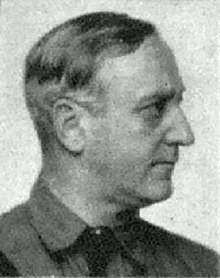Heinrich Bichmann
Heinrich Karl Franz Bichmann (born January 6, 1884 in Lauterbach , Hesse ; † May 15, 1945 in Bad Homburg in front of the height-Gonzenheim ) was a German economist and politician ( NSDAP ).
Live and act
Heinrich Bichmann was the son of the secret government councilor Karl Bichmann and his wife Maria, née Hoffmann. After graduating from high school in Darmstadt in 1902, he studied history, political science and law at the universities of Berlin, Freiburg and Gießen. He acted as chairman for the VDST in Giessen. He interrupted his studies in 1905 and entered the Infantry Body Regiment No. 117 in Mainz . In 1909 he received his doctorate as Dr. rer. pol with an economics thesis on the flow of interest since 1894 , which analyzes the dangers of the debt and interest economy for the state and the economy and for which he was awarded the special prize of the University of Strasbourg .
Due to a serious illness, Bichmann left the army as a lieutenant. Instead, from 1910 onwards, he pursued practical economic and political professions in the Rhineland and Central Germany. He had four children with his wife Elisabeth, née Schroeder. From 1914 to 1918 Bichmann took part in the First World War as a company commander and battalion commander , in which he was wounded several times. As a captain ad he was dismissed from the army with several awards after the end of the war. Finally he became chairman of the Thuringian employers' association in the cement industry.
On January 1, 1930 he became a member of the NSDAP. From April 1931 to 1934 served as Bichmann Gau Economics Adviser of the party and from February 1932 also as a business speaker of the Thuringian Gau. On March 28, 1933, Bichmann was appointed State Commissioner for Economy (Chambers of Industry and Commerce) by the Thuringian state government and held this office for only a few months until mid-July of this year. From July 1932 until the dissolution of this body in October 1933 he was a member of the Landtag of Thuringia . He then represented constituency 12 (Thuringia) in the National Socialist Reichstag from November 1933 to March 1936 . He was not re-elected. Shortly after the end of the Second World War, he died of a stroke .
Fonts
- The Wertpapier-Zinfuss in Germany since 1895 , 1911. (Dissertation; republished as The Interest Flow since 1894. Prize publication of the law and political science faculty of the Kaiser Wilhelms-Universität zu Strasbourg i. E. , 1912.)
- From the higher management in the large supervisory service. Epistemological consideration , Berlin 1926.
literature
- Joachim Lilla , Martin Döring, Andreas Schulz: extras in uniform. The members of the Reichstag 1933–1945. A biographical manual. Including the ethnic and National Socialist members of the Reichstag from May 1924. Droste, Düsseldorf 2004, ISBN 3-7700-5254-4 .
- Marc Zirlewagen: Biographical Lexicon of the Associations of German Students, Vol. 1: Members A – L. Norderstedt 2014, ISBN 978-3-7357-2288-1 , pp. 63f.
Web links
- Heinrich Bichmann in the database of members of the Reichstag
Individual evidence
- ↑ Death book of the registry office Bad Homburg vor der Höhe I No. 313/1945.
| personal data | |
|---|---|
| SURNAME | Bichmann, Heinrich |
| ALTERNATIVE NAMES | Bichmann, Heinrich Karl Franz (full name) |
| BRIEF DESCRIPTION | German economist and politician (NSDAP), MdR |
| DATE OF BIRTH | January 6, 1884 |
| PLACE OF BIRTH | Lauterbach , Hesse |
| DATE OF DEATH | May 15, 1945 |
| Place of death | Bad Homburg in front of the Höhe-Gonzenheim |
